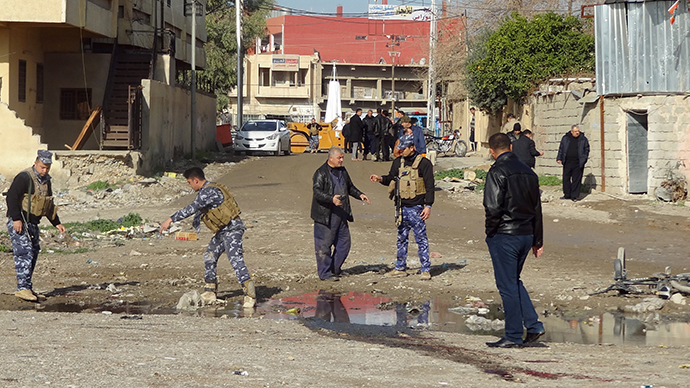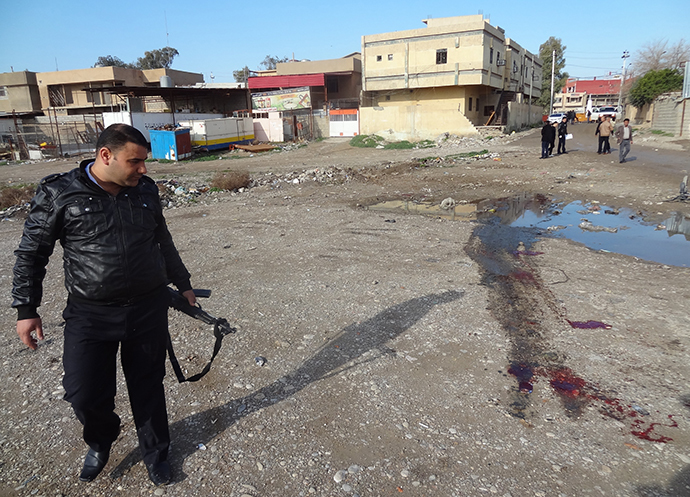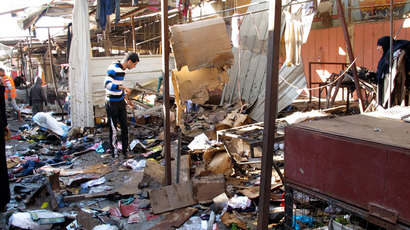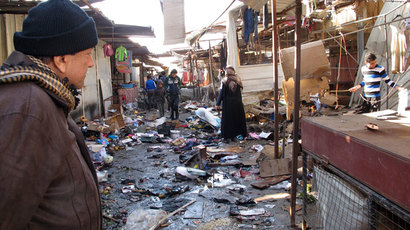Wave of attacks kills at least 30 in Iraq

A spate of armed attacks across Iraq, including car bombings, has left at least 30 dead and scores injured. Meanwhile the central government is struggling to regain control of Fallujah overrun by al-Qaeda and other insurgent groups early this year.
Numerous car explosions struck the capital Baghdad on Saturday.
In Mansour neighborhood, at least four people have been killed
and 12 others wounded in a car explosion, according to police.
Another car bomb at the bus station in eastern Baghdad killed
four people and wounded six, authorities said. A blast near one
of the hospitals in the north of the capital killed four and
injured 8 people.
Further explosions in a busy commercial street in western Baghdad
took the lives of at least two people and wounded 13, officials
announced. Four more were killed and 13 wounded near a juvenile
prison in Toubchi district. Authorities had to seal the area to
search for the inmates, as some of the convicts managed to escape
following the blast.
Mortar shell fire in al-Adil neighborhood killed three people and
wounded nine. Another bomb explosion in Amariyah commercial
district killed two people. Three more have been killed in an
explosion inside a market in Baghdad's Madain area, which also
wounded at least nine people.
In the northern city of Kirkuk also at least one person was
killed and 15 wounded in an attack, according to the police said.

Violence in Iraq has been on the rise over the past year, with
almost 9,000 people killed in 2013 which became the bloodiest year for Iraq since 2008,
according to UN estimates.
In December violence escalated further, after authorities broke
up an anti-government Sunni protest camp and arrested a Sunni
lawmaker on terrorism charges in Anbar province. With the rise of
tension the army was forced to pull back from the province,
allowing al-Qaeda fighters to seize control of Fallujah and parts
of the provincial capital Ramadi.
Over 500 people including many civilians were killed in Anbar
during the in-fighting between rebel groups and the
al-Qaeda-linked Islamic State of Iraq and the Levant since the
beginning of 2014. At least three people were killed in overnight
clashes on Saturday as Iraqi security forces and allied Sunni
tribesmen tried to regain control in the area.
On Saturday, US Vice President Joe Biden held a phone
conversation with the Iraqi Prime Minister Nouri al Maliki to
discuss the fighting in Anbar. Earlier this week, Iraq asked the
United States for new arms to fight the ISIL militants and asked
US troops to train its counter-terrorism forces. According to US
Army Colonel Steve Warren, a Pentagon spokesman, the military aid
will be delivered to Iraq “as rapidly as possible,” but
US officials did not announce any plans of military training for
Iraqi troops.
Although the provincial capital Ramadi is mostly under central
government control, scores of heavily armed ISIL fighters are
still in control of Fallujah and the government cannot block the
flood of new weapons and reinforcements to the area.
“The tribes scattered around Fallujah have zero loyalty to
the central government,” Sheikh Mohammed Al-Bajari, a tribal
leader and negotiator in the city, told Reuters by phone.
“Now [the army] are not controlling anything and no roads can
be closed,” he said of Fallujah’s southern approaches
entirely under control of tribes hostile to the government.














